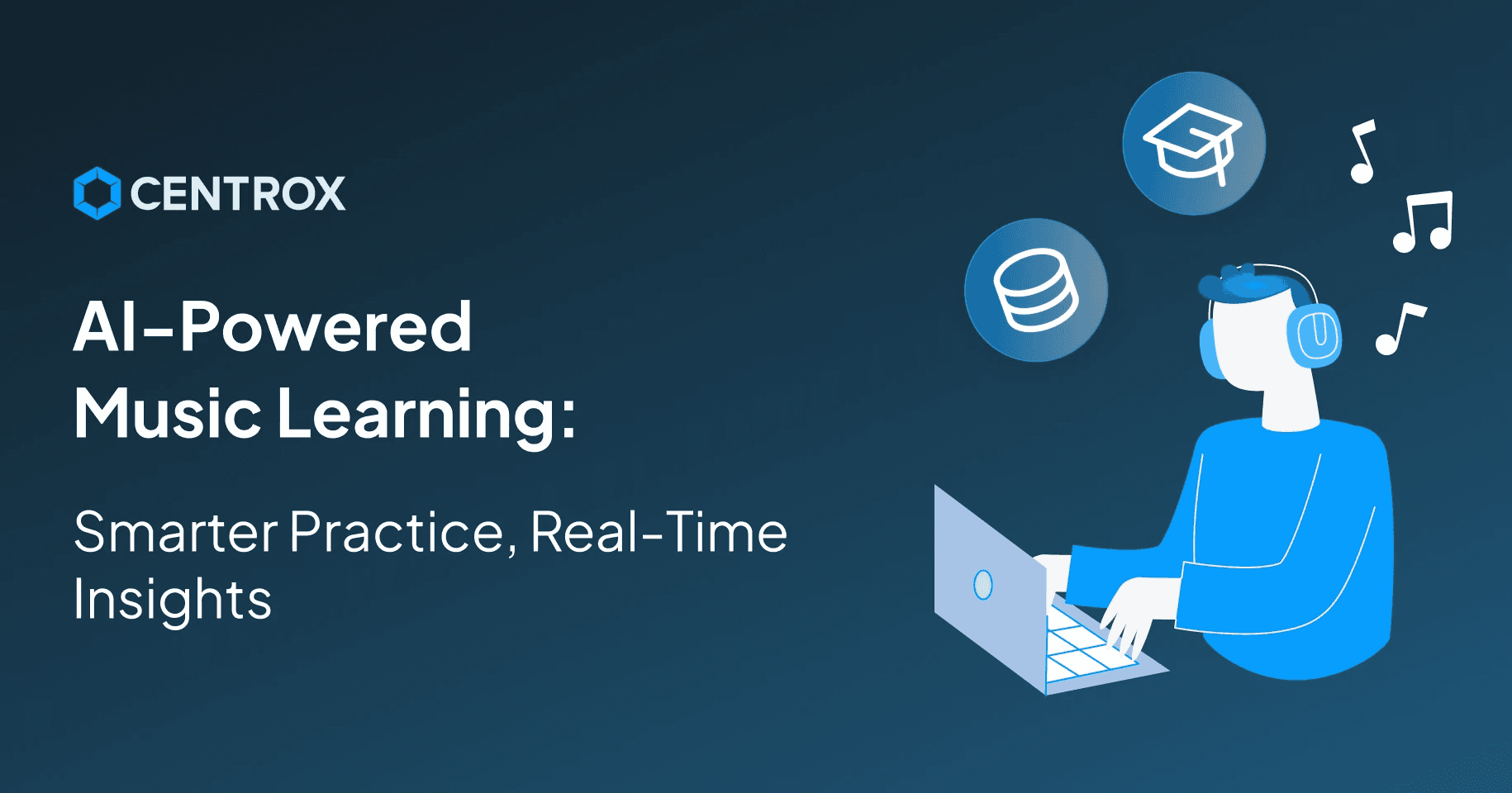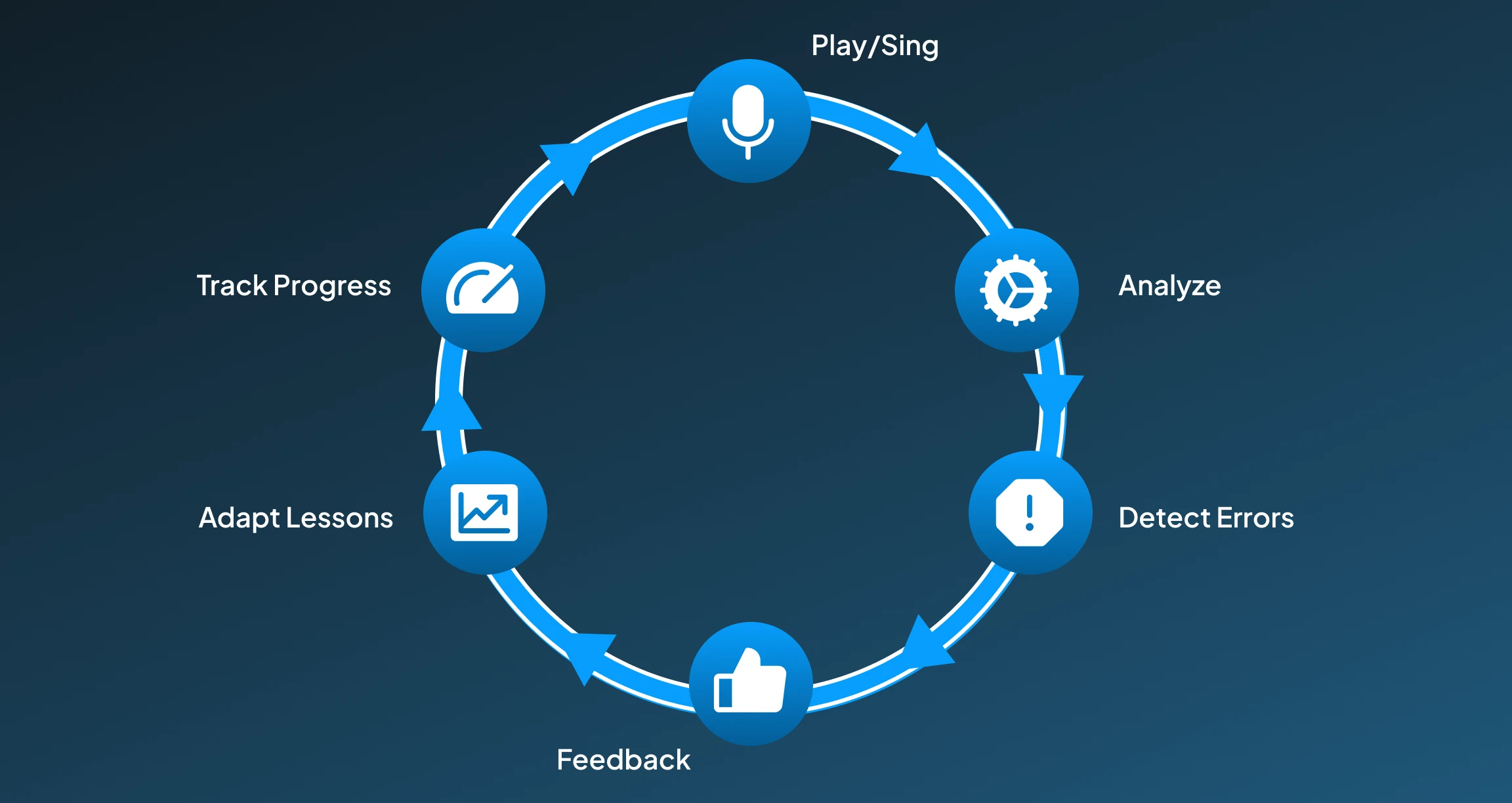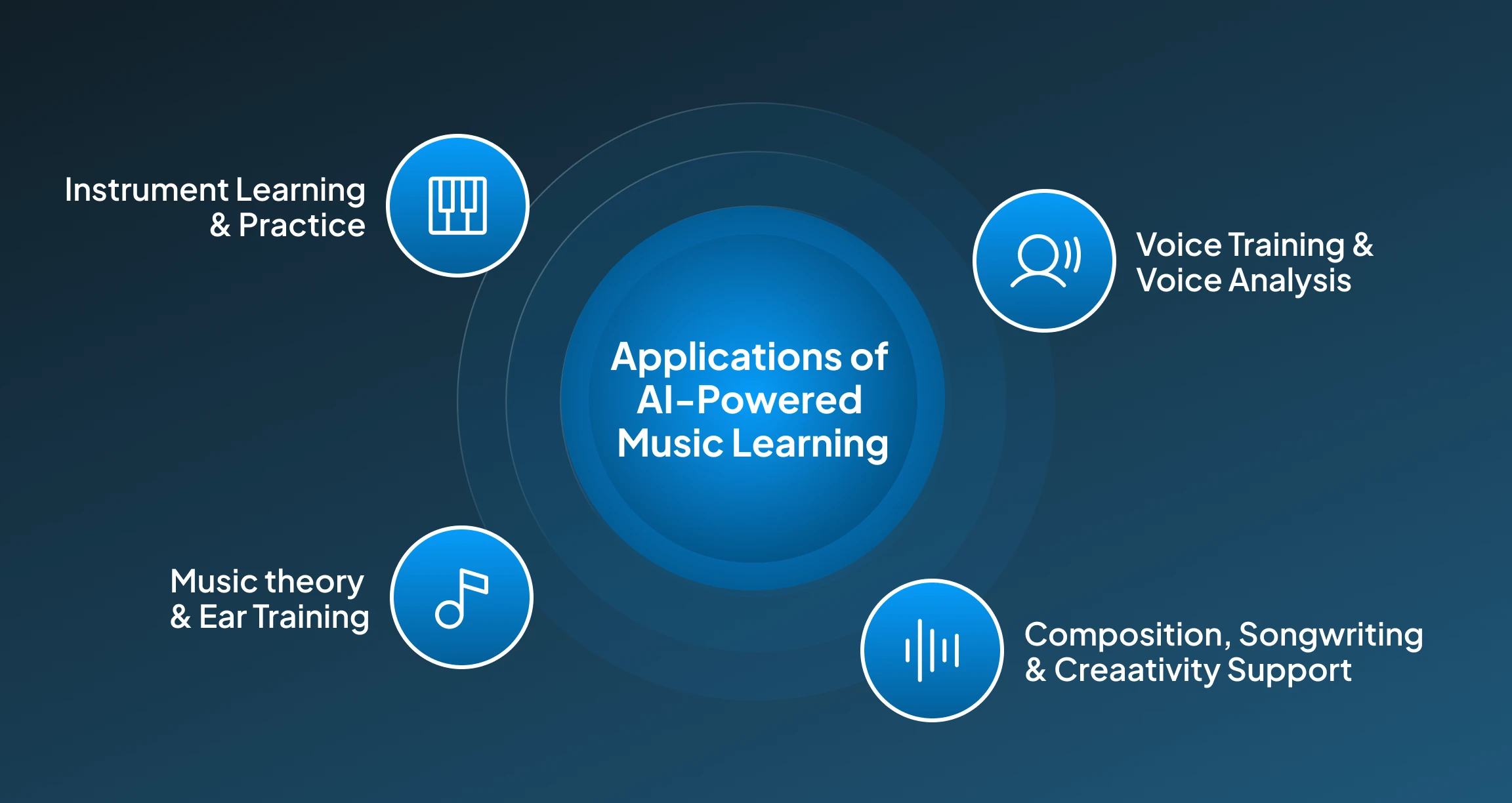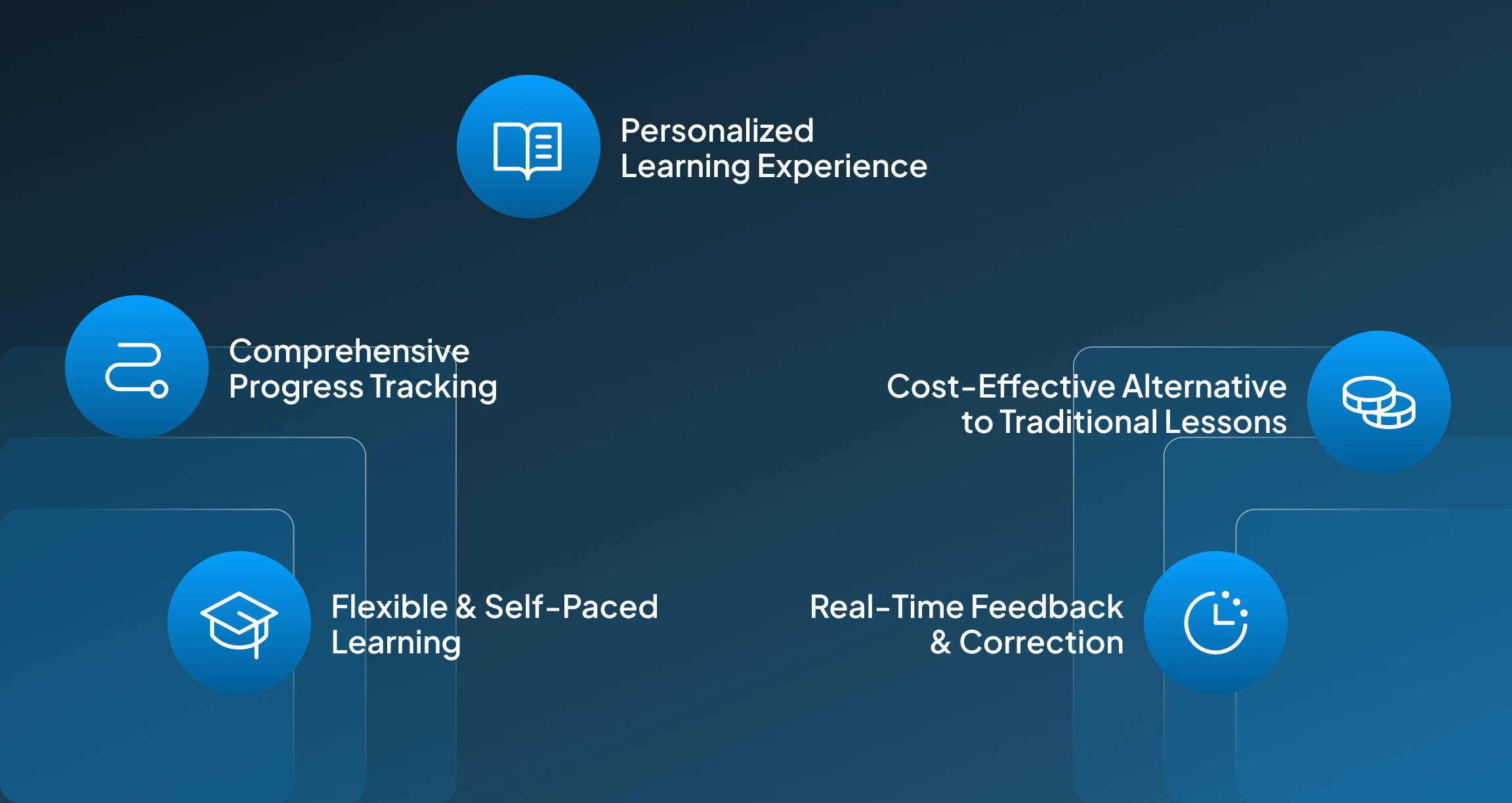AI-Powered Music Learning: Smarter Practice, Real-Time Insights
Explore how AI music learning tools work to enhance your creative skills, their benefits, challenges, and how they can accelerate musical growth.
10/3/2025
artificial intelligence
11 mins

With changing audience preferences in entertainment and the music industry, it's definitely tough to maintain creative quality, especially for song production. While working in the music industry, it's important to learn and upskill oneself every day. But traditional learning means have dependency, which makes learning time and effort consuming.
AI-powered music learning tools appear here appears as a smart solution that can help in nurturing, evolving, and enhancing the musical sense of musicians and producers. Such AI-driven music learning tools allow users to learn music right from the start. This tool can help in enhancing the technical as well as creative skills. These AI music learning solutions can assist in developing instrumental skills, vocal training, and understanding music theory, helping you learn ear training, composition, and production, while allowing you to track your progress through analytics.
With our blog, we will help you find out how AI music learning solutions can revolutionize the dynamics of the music industry. In this, we will explore how AI music learning platforms works, their application, benefits, and challenges which are involved in it. This will allow you to plan a solution that is ahead of these arising limitations, and provide you with a platform to grow and enhance.
Challenges of Traditional Music Learning
Conventional ways for music learning, such as going for in-person classes or enrolling in music academies, require you to follow a strict timeline and routine. Although these ways provide very essential in-person guidance, they come with their own set of challenges that act as an obstacle in the learning experience. Below, we have highlighted a few challenges that learners come across in traditional music learning.
1. Limited Personalization
Conventional music learning often comes with a fixed curriculum, having very little space for customization. As every student has their own learning pace and a different approach to grasp concepts, and here traditional approaches are rarely able to adapt. Because of this, some learners struggle to keep up with it, whereas it might be easier for others; some might lose motivation because of repetitive lessons.
2. High Cost
Going for personalized music learning or joining a reputable educational institution can have a high cost, as it involves commute, instructor fees, and instrument maintenance costs. This makes conventional music learning a bit unapproachable for interested learners, especially beginners or those from smaller towns, to afford consistent, long-term training.
3. Rigid Scheduling
For traditional music lessons, learners need to follow a specific schedule, which could be difficult to manage, especially if you have to balance school, work, or other household responsibilities. Here, missing a session might lead you to fall behind in the courses, and rescheduling the lessons to cover up might add more cost.
4. Slow Feedback Loop
In traditional setups, feedback loops often depend on the instructor’s observation during lessons, and how they perform their learning practically. This delay in feedback might slow down progress and learning, and may make it difficult to make a strong foundation.
5. Limited Accessibility
Access to quality music education depends heavily on geographic and socioeconomic factors. Learners in remote or underserved areas may not have skilled teachers or well-equipped music schools nearby. This lack of accessibility restricts opportunities for many who are passionate about learning but lack local resources.
How Can AI Music Learning Be Helpful?
AI-powered music learning emerges as a strong alternative to traditional learning. It makes learning more personalized and affordable. With its features for providing real-time feedback, it adapts to individual skills and understanding levels, and can even provide personalized feedback and suggestions. This doesn't just make music learning convenient, but also makes it fun, creative, and accessible for people around the globe.
AI-Powered Music Learning
AI-powered music learning tools utilizing artificial intelligence algorithms can lead to powering amazing teaching and guiding platforms for learners in playing instruments, singing, and understanding music theory. Such a platform provides personalized lessons, real-time feedback, and adaptive exercises based on individual performance. Combining technology with music education makes learning more efficient, accessible, and engaging for all skill levels.
How AI-powered Music Learning Works?
AI-powered music learning is based on artificial intelligence to provide personalized, interactive, and efficient musical education. These tools can track progress, evaluate performance, detect errors, and adapt lessons to help learners build and enhance their music, singing, and production skills. Below, we have listed the steps that go behind these AI music learning tools:

Step 1: Audio Input and Signal Processing
The process of AI music learning tools begins when the user provides input by playing an instrument or singing a song into a connected device. This AI system starts capturing the input audio and converts it from an analog signal to a digital format using Digital Signal Processing (DSP) techniques. This transformation enables the system to analyze sound characteristics, such as pitch, amplitude, tempo, and timbre, laying the foundation for accurate performance assessment.
Step 2: Feature Extraction and Analysis
Once the input audio is converted into digital form, the system starts to extract key features using techniques like the Fourier Transform, Mel-Frequency Cepstral Coefficients (MFCCs), and spectral analysis. Using these features it helps the AI find out musical elements such as notes, chords, intervals, rhythms, and dynamics. Then the machine learning models further process this information to detect errors, such as incorrect pitch, timing inconsistencies, or improper fingering, enabling precise performance evaluation.
Step 3: Error Detection and Feedback Generation
In this step, the AI system evaluates the learner’s performance using pre-trained deep learning models, often convolutional neural networks, fine-tuned on large datasets of expert music samples. Instead of simply comparing the input to a reference score, the model detects nuanced patterns such as pitch stability, timing accuracy, articulation, and tonal quality. By recognizing these subtle deviations, it delivers real-time corrective feedback and highlights specific areas for improvement. This pattern-based error detection enables learners to understand precisely how their performance differs from expert-level playing.
Step 4: Personalized Adaptive Learning
In this step, the AI evaluates the user’s performance and adjusts lesson difficulty using supervised machine learning models trained on large datasets of correct and incorrect performances. Instead of relying heavily on reinforcement learning, which is better suited for decision-based tasks, the system combines supervised insights with rule-based scaling to modify exercises, introduce targeted drills, and tailor practice routines. This ensures each learner receives personalized guidance aligned with their skill level and progress.
Step 5: Progress Tracking and Analytics
Finally, in the last step, the AI system continuously tracks the learner’s singing or playing performance over time. Instead of relying solely on visual trend charts, it uses machine learning techniques such as regression models and time-series forecasting to analyze patterns in pitch accuracy, rhythm consistency, tempo stability, and practice duration. These models help predict future performance trends and highlight areas needing attention. The system then generates clear progress reports and actionable recommendations, enabling learners to understand their development, set realistic goals, and plan effective practice routines for faster improvement.
Applications AI Can Power for Music Learning
AI music learning tools are revolutionizing the traditional ways of learning, creating, practicing, and experimenting with music. Such tools hold the best combination of intelligent analysis with tailored instructions, adapting to learners' understanding ability to ensure faster and more convenient access to music education.

1. Instrument Learning and Practice Assistance
AI music learning tools can support the interested in learner in building their skills for playing an instrument like piano, guitar, violin, drum, flute, or any other instrument. These tools take the input audio and provide real-time feedback on pitch, timing, and technique. They guide beginners through structured lessons and correct mistakes instantly, making practice more efficient.
2. Vocal Training and Voice Analysis
AI-powered vocal coaches can analyze pitch accuracy, breath control, tone quality, and timing. These tools can adapt themselves and offer personalized exercises, warm-ups, and suggestions to improve singing skills. Through these, both beginners and professionals refine their voices.
3. Music Theory and Ear Training
From these AI apps, learners can be taught about scales, chords, timing, and notation through interactive lessons. It can help the learners grasp an understanding of music theory right from the basics. They also improve ear training, enabling users to recognize intervals, chords, rhythms, and melodies, adapting difficulty based on performance.
4. Composition, Songwriting, and Creativity Support
AI music tools can also assist musicians in their creative process. From composing melodies, harmonies, and chords to suggesting enhancements, these tools allow users to experiment with music progressions. Such a solution can play a significant role in allowing song composers, writers, or producers to uplift their creativity by suggesting multiple variations for a song, and eventually simplifying the whole creative process.
Benefits of AI Music Learning
AI music learning tools are definitely a transformative idea, totally advancing how beginners or established musicians can learn and improve their skills. These tools are a great combination of intelligent feedback, adaptive lesson structuring, and ensuring accurate progress tracking. Here are a few benefits of AI learning music tools:

1. Personalized Learning Experience
AI music tools allow learners to identify their individual strengths and areas of improvement. By identifying these aspects, it helps in customizing the lessons according to students' skills, interests. This customization ensures that students always work on the right skills at the right time, making learning smoother and more enjoyable.
2. Real-Time Feedback and Correction
AI music learning tools can identify pitch errors, timing issues, and technique problems in real time. These can also suggest an immediate correction right away. Thus, it helps learners fix mistakes before they become repetitive, and ultimately encourages faster skill development, more accurate and consistent performance. (Jing Jiang et al., 2022)
3. Flexible and Self-Paced Learning
Through such tools, learners can practice anytime and from anywhere around the world without needing to follow a fixed schedule or instructor availability. This flexibility allows it to support consistent practice while making it easier to balance music learning with work, school, or other everyday responsibilities.
4. Cost-Effective Alternative to Traditional Lessons
Compared to private classes or music institutes, AI platforms offer high-quality instruction at a fraction of the cost. Subscription models, free trials, and accessible apps make structured music learning affordable for a wider audience.
5. Comprehensive Progress Tracking
AI music learning tools can track progress in pitch accuracy, rhythm, technique, and practice consistency. With these insights, the interested learners can build their growth and structure their practice sessions accordingly by using the data rather than depending on assumptions. (Alexander et al., 2018)
Challenges of AI Music Learning
AI-powered music learning brings many advantages, but it also introduces challenges that learners must be aware of. These limitations affect accuracy, emotional guidance, accessibility, and the overall learning experience. Understanding these challenges helps users balance AI tools with traditional methods for effective musical growth.
1. Limited Emotional and Artistic Understanding
AI excels at technical accuracy but struggles to teach emotional expression, musical interpretation, or stylistic nuance. These human elements—phrasing, feeling, and performance depth- still require human guidance or advanced musical experience. (Man Zhang et al., 2025)
2. Accuracy Issues in Complex Audio Environments
AI tools can misinterpret sound in noisy settings, when notes overlap, in fast passages, or when advanced techniques are used. Instruments like a violin or drums, with rich harmonics, often cause detection errors, leading to inaccurate feedback.
3. Lack of Personalized Human Mentorship
While AI adapts to skill levels, it cannot replicate the mentorship, motivation, or inspiration provided by an experienced music teacher. Learners may struggle without the emotional connection and encouragement humans offer. (Kyoungwon et al., 2021)
4. Over-Reliance on Technology
Students may become dependent on visual cues, on-screen guidance, or instant analysis. This can weaken natural listening skills, creativity, and musical intuition, core abilities essential for real-world performance.
5. Data Privacy and Device Requirements
AI music tools need microphones, continuous audio access, and sometimes cloud processing. This raises data privacy concerns and requires strong internet or good-quality devices, making it less accessible for some learners.
Could AI Be Your Key to Faster Musical Growth?
AI-powered music learning tool emerges as an innovative yet reliable alternative to traditional practices by making music education more personalized, accessible, and cost-effective. With its smart AI-enabled systems, it becomes a significant help for learners seeking consistent progress, immediate feedback, and flexible practice.
Adopting AI tools can significantly accelerate skill development. By starting with integrating an AI-based app into your routine, using its real-time guidance to correct mistakes early, and tailoring sessions to your goals, users can experience continuous improvement in their understanding and creative music skills.
With essential features like adaptive exercises, progress analytics, and creative composition tools to enhance both technique and creativity. Whether you're a beginner or an experienced musician, embracing AI-driven learning can help you practice smarter, stay motivated, and achieve measurable musical growth faster than ever before.
Are you curious how AI can evaluate your skills and suggest the most effective learning path for faster musical progress? Book a session with our expert at Centrox AI today and discover how these tools can accelerate your progress.

Muhammad Haris Bin Naeem
Muhammad Harris Bin Naeem, CEO and Co-Founder of Centrox AI, is a visionary in AI and ML. With over 30+ scalable solutions he combines technical expertise and user-centric design to deliver impactful, innovative AI-driven advancements.
Do you have an AI idea? Let's Discover the Possibilities Together. From Idea to Innovation; Bring Your AI solution to Life with Us!
Your AI Dream, Our Mission
Partner with Us to Bridge the Gap Between Innovation and Reality.
